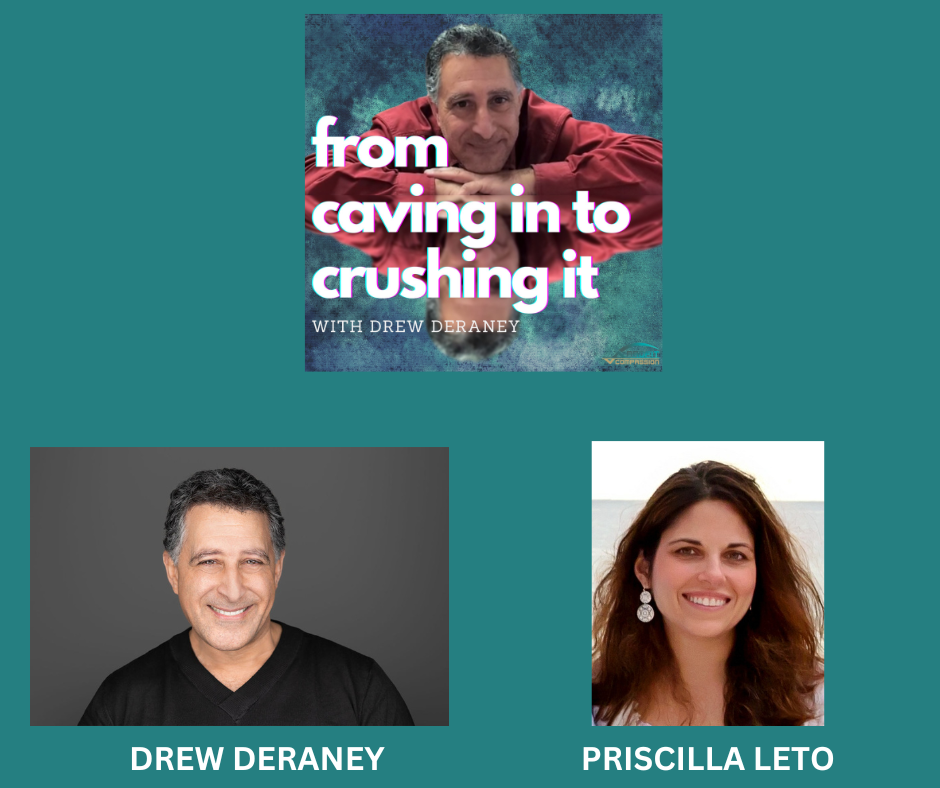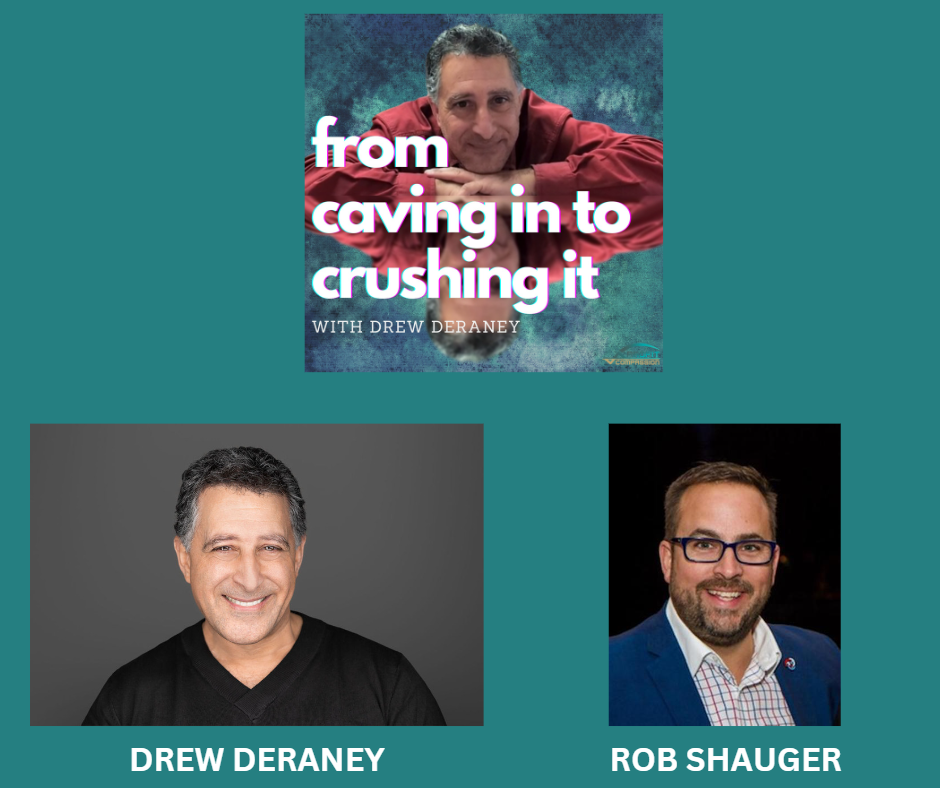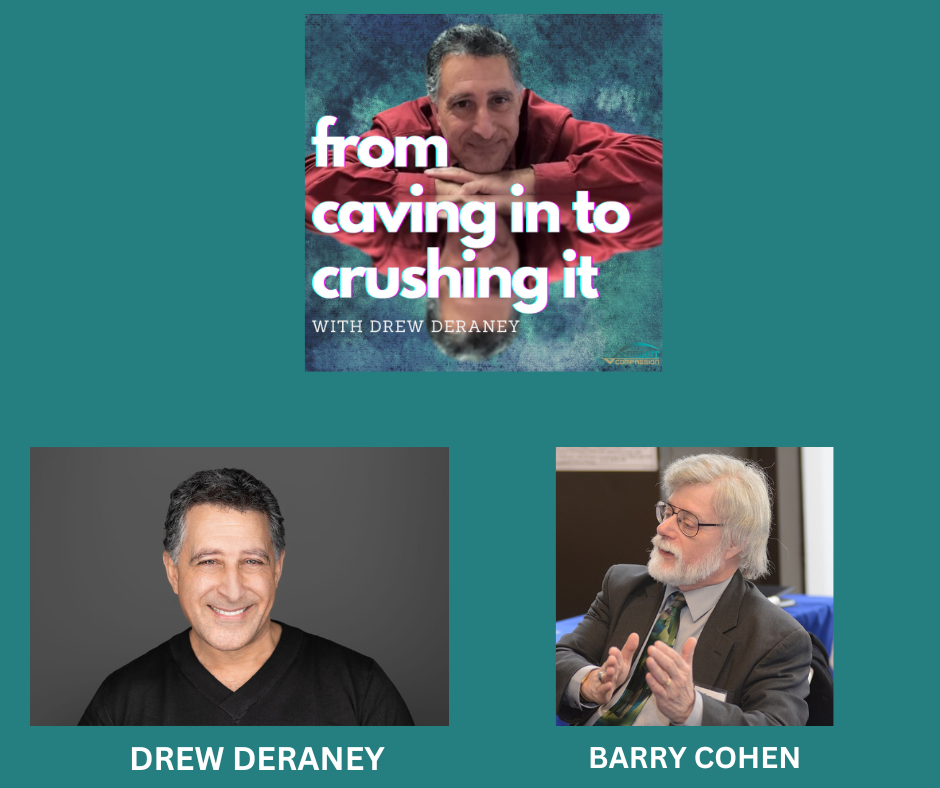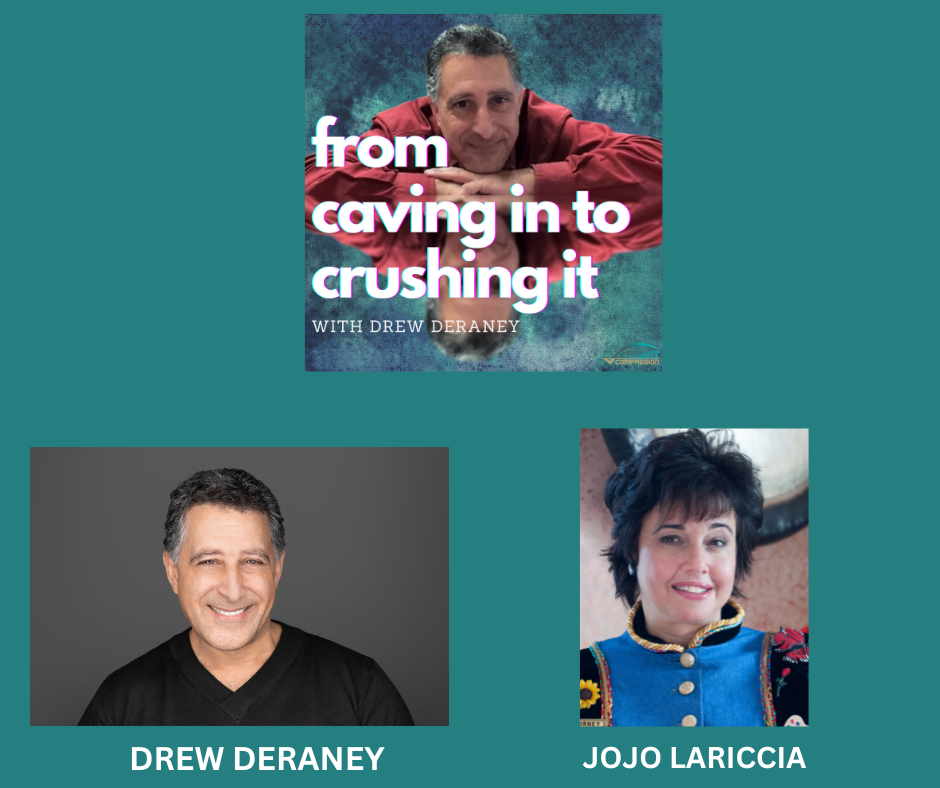[00:00:06] Speaker A: Welcome to From Caving In to Crushing It, the podcast for those who find themselves immersed in adversity and choose to write their story instead of having others write it for them. I'm Drew Deraney and I'm your host. Hi, Priscilla. It's so good to see you.
[00:00:24] Speaker B: We're in. How are you?
[00:00:25] Speaker A: I'm doing well, thank you. So in the beginning, I always thank the person who introduced me to the guest, so I have to thank Paul, and I hope I don't mess up his last name, Chiaravella Chiaravella. He's going to get mad at me. But Paul, we're all in North Jersey Chamber of Commerce together. So I thank Paul for introducing me to you, Priscilla. And I recall when I was speaking with him, when I mentioned that my oldest son has autism and that when he was a child, we were trying to help him, was so challenging to find the proper resources for him. He said, well, Drew, I have to introduce you to Priscilla. And I remember when we had our call, we had so many things in common. To be able to share stories with somebody who's in the same similar shoes and familiar with children with special needs. It was comforting to me to be able to have a talk with you and learning about your organization. I really wanted to have you on for a couple of reasons. One, to promote the organization because it's so important that people are aware and they know what to do. But number two is I know you went through a lot in your life and you are a person who chose not to retreat. You chose to move forward and do something positive with the challenges you went through in life. So I thank you for coming on and that's why I wanted you on. Plus, you're an awesome human being. If you could reach back as far as you could recall and pinpoint that defining moment in your life, Priscilla, that really made you believe and realize that there's a better way to live. And you're going to take charge of the situation and take that challenge and move forward and see it as a positive rather than retreat, something that's helped mold you to who you are today.
[00:02:07] Speaker B: So I have a 17 year old son who's on the autism spectrum.
Back when he was little, we did not really realize that there was an issue. I didn't have any reference points.
I didn't have any kids around.
And I think I was also in a bit of denial.
He had language up to a certain point, and then it kind of just stopped. So he would say some words, just kind of he'd like, walk around and be like pizza Batman, but not to anybody. And he didn't answer questions. He didn't answer to his name.
There was no spontaneous language. He had a lot of other different issues, too. He would bang into walls if he was walking down a hallway, couldn't get up and downstairs easily.
You couldn't take him anywhere. He'd get very stuck on things. Take him to a game, stop, forget it. He wouldn't leave. You'd have to drag him out kicking, screaming, because he'd have to look at every single box.
And then we got him diagnosed and everybody told me, there's really nothing you can do.
He was already in a special program at a school. He had Otpt, speech, all that through the school. And when we went to the doctor, they wanted to put him on medication. He was four, and they just said, put him in the school with the programs. I said, I already have that. And that was really all you can do. And so many people like the doctors told me that and people that I talked to, they all said, oh, there's nothing really you can do the best that's going to happen.
And that bothered me. And also I didn't want to put him on medication because he was so little, so I never did. And back then, I mean, he's, now he has some medications, but back then I didn't want to put him on anything because he was so little. And I started doing some research.
My sister also started doing some research and we were looking into what could be the root cause of what was going on with him.
There's such a broad range, autism is such a broad range of symptoms and challenges that I was like, there's got to be something that you can find out instead of looking at as, okay, it's autism. Looking at it more like whatever his challenges and what could possibly be the thing that is driving the issues that he's having.
[00:05:08] Speaker A: Right.
[00:05:09] Speaker B: So we were researching that and we were looking for programs and therapies and things that we could look into that would help him. And we did find some that really did work on the root causes of what he was going through and breaking it out into, okay, this is what he's having problems with. And let's work on instead of like, let's teach him social skills. If you have a child that can't receive that information, no matter how much you try to do speech therapy or social skills therapy to that child, if they can't receive that information because there's something lower level that's happening and you don't resolve that, you could keep doing that forever, it's not going to move you forward. Right?
[00:06:00] Speaker A: You mean receiving that information with the synapses in the brain kind of connecting the information to allow them to process it? Is that yes. Okay.
[00:06:10] Speaker B: Yes. So if you have a child who has a problem with their gut and they have inflammation and that's one of the underlying major reasons that they're having problems, you could do all the therapy you want. If you don't get that under control, you're only going to get so much from that. Right. Because you're always battling the inflammation, right? Absolutely.
If you have a reflex that is like, you have a baby, right, and you touch their hand, they automatically do this, right?
[00:06:49] Speaker A: Right.
[00:06:49] Speaker B: So if a child holds on to that reflex, that's going to stunt all of their other development. So if you don't deal with integrating that reflex, it's like this underlying problem that's never going to get you're never going to get past that unless you deal with that. You may get progress from all the therapies, but if you're not dealing with the lower level problem, you never get to the next level. Okay, so we spent a lot of time doing therapies that were getting to the root cause, changing his diet, supplementation, detoxing, a lot of things like that. And he had a ton of progress.
And by the time he was, I want to say five and a half, he was conversational and you could take him anywhere.
He didn't have the temper tantrums that he had, and it was just a completely different trajectory in his development from what he was at.
He still has a lot of challenges and we still do a lot of therapies with him, but I think all the time about what his quality of life would have been like if we had listened to everybody that was telling me, there's nothing you can do. And this is the best type of what's considered the mainstream type therapies.
I'm very thankful that we were able to do that for him and that we had that outcome. And I still continue to research things and there's new things that come up all the time, and we try different things.
I'm trying to give him as much independence as possible now that he's which is scary. He's turning 18 soon, and we're on to another chapter, but again, I think all the time about what his quality of life would have been like if we hadn't pursued the things that we did. But then that also creates another challenge because all of those therapies aren't covered by insurance and they're very expensive.
[00:09:14] Speaker A: Wow.
[00:09:15] Speaker B: And we were lucky that we were able to provide that for him, but that's not the case for a lot of families. So I'll talk to families all the time and they'll be like, oh, that sounds great, we should do that.
And you tell them how much it's going to be. And always a cover by insurance. Now it's not covered by insurance.
How are we supposed to do that?
Sometimes people try to do things on their own and they try to do things at home, but if you don't have professional guidance, it's really difficult.
That's where the challenge comes from, is a lot of things exist, but trying. Number one, to find out about them. Number two, to try to find therapists, because there's a lot of therapies that they're all booked. You can't even find anybody to do some of these things for you. And then three is paying for them.
[00:10:08] Speaker A: You pay for it. Yeah.
Think about the percentage of kids and adults who have autism.
And the fact that it's not covered by insurance is a trap. Honesty.
And do you know if there's something happening grassroots to get the politicians to work with the insurance carriers to include at least some kind of coverage.
[00:10:43] Speaker B: I know that a lot of the different therapies will try to move that forward, that they're going to get some sort of coverage. It's just really hard because a lot of them are not mainstream. They're considered alternative, they're considered not necessary. You have to have all of these clinical trials, and I know in particular, the one therapy that we've done, they've been trying to do clinical trials. But if you have something that you can't wait 15 years no. For something to have enough data for them to get insurance coverage too.
[00:11:31] Speaker A: Right, yeah. No, the earlier that you can get the treatment, the better. And it puts parents in a difficult position where they are forced to make a decision money or help my kid.
So I know that you're on a mission and you have an organization that you're very involved in. Can you tell us a little about how you got there after helping your son? I'm very intrigued.
[00:12:04] Speaker B: So I used to work at one of the centers that he went to, and people would call in and they would ask about the program, and I would tell them, and again they would say, oh, this sounds great. And then you'd give them the price and is it covered by insurance? No, it's not covered by insurance. It's considered non medical. And people would cry to me on the phone.
I left that job within six months because I couldn't handle being on the phone all day long, rehashing number one, rehashing my son's story over and over and over again and then having disappointed people get upset on the phone.
So that always bothered me. And then there was just kind of a series of events that happened and I was talking to some of the other people that were involved in the program, and I don't even know how it happened. It was just like one day a decision was made that we were going to start an organization to help families be able to afford these types of therapies. And one thing led to another, and then 2019, we got approval. We had one fundraiser and then COVID hit, but then we still got through. We still got through. And then we had a virtual fundraiser during that whole fun time.
[00:13:34] Speaker A: Yeah.
[00:13:37] Speaker B: It'S mission kids success.
So what we do is we provide grants for families to get service and therapies that they're having a hard time affording for their children. And we work directly with the providers, so we pay the providers directly for the services that they receive. So we make sure that it's going to the right place.
Our grants are also partial grants so that the families have to have investment into the program itself so that we make sure that they have the most efficient use of the funds and we consistently follow up with the families and the providers to make sure that they're attending regularly and to track their progress.
We're 100% volunteer based.
We do everything out of our houses.
We have very low administrative cost. That's covered by our board members and our main sponsors. So anybody that makes a donation, it goes directly to the grants.
And we've helped probably about 20 families at this point, but we have a lot more to announce very soon.
Yeah. We cover all of New Jersey and parts of New York, Connecticut, and Pennsylvania.
[00:14:55] Speaker A: That's beautiful. Now, last time we spoke, you provided me with a link to a video that I watched twice, and I actually had my son Matthew, who's got autism, watch with me. And that was of your son in mixed martial arts. I love that. Can you please tell me about that whole event? And I was, like, in awe of watching how passionate and your son's name is Matthew. And my son's name is Matthew. So that's why we click. Can you tell that story about that whole mixed martial arts thing?
[00:15:35] Speaker B: So Tiger Schulman's had a fundraiser for an autism.
It was it was so great. It really was.
They had a bunch of students that had different challenges be part of this fight night with real MMA fighters, and they did it for real. It was like a real fight. They had commentators and a video feed, and each person came out to their own theme song. My son came out to the Star Wars. Darth Vader march. They all had their own names. He was the chosen one. They interviewed him. He took it so seriously.
It was great.
They had to stop the fight because he was beating up the guy, too.
[00:16:33] Speaker A: Was. I'll tell you, I loved it. I watched it twice, and my son was telling me what types of kicks your son was trying and explaining it to me.
I remember your son had a spinning back kick.
[00:16:49] Speaker B: Yeah, the spinning back kick and the spinning back punch.
He likes to use that a lot.
[00:16:57] Speaker A: I love that.
[00:16:58] Speaker B: That's a signature move.
[00:17:02] Speaker A: I think what I'll do is I still have the link. I'll put that in the show notes as well, if it's okay with you. People can watch that. Because really, the message there is that children and adults with special needs are amazing human beings. And we humans who don't have special needs can learn a lot from people who do, because you talk about resiliency and perseverance and believing in yourself and not giving up. It's powerful. I mean, I've learned so much from my son, and I'm sure you've learned a ton from yours and the other children in the program that if we just open ourselves up to being a support system for children with special needs. And I'm talking about education, the insurance companies, pharmaceuticals, the government, everybody.
We'll have a much better so, Priscilla, I could probably talk to you for hours and I wanted to ask you a couple of questions and then I'm going to tell the audience how they can get in touch with you and how they can help Mission Kids success. So you have an opportunity to sit down with young seven to ten year old Priscilla and you want to give her advice about life. What are you going to tell her?
[00:18:37] Speaker B: Definitely life is not an A to Z type path. Like, you're not going to just go, you're going to do this and you're going to do this and you're going to do this and you're going to do this and you're going to end up here.
It's very much like a to age and you really don't know what life is going to happen, what's going to happen to you. I was an accountant.
I was very career focused. I did not think that if you told me today that we would have started a charity and all of the things that have happened over the years too of him, it's been an interesting life with him having being on the autism spectrum, we've been through experiences that I would never have.
That's the one nice thing. I've been through a lot of experiences that I would have never have been involved in, such as that fight. And he did film camp. He did the Joey Travolta film camp for a few years. That was amazing.
And then just all the people too that I've met over the years, the wonderful families that I've met and it's just been a very different experience. So you never know what life is going to hand you and the best thing that you can do is make the best out of it. And don't really listen to experts sometimes because they have their own perspectives and if something doesn't sit right with you, you have to do your own research and see what makes sense to you too and not give up on things.
[00:20:31] Speaker A: Wonderful advice. Yeah, I agree. We all need to self advocate and if our children can't advocate themselves, we need to do it for them. And you're right, the term experts should be used loosely because it's an overused word. So I give you credit with that's. Wonderful advice.
Different hat. You are now sitting down with Priscilla, the young businesswoman entrepreneur, and you are going to give some advice on business. What are you going to tell her?
[00:21:10] Speaker B: I would say that you are going to make different decisions in your life that you may feel like you regret because you didn't think them through as much as you should, but that all of those things will help you. Eventually you will take something from all those experiences and they will help you in something that will come down the line someday, if that makes sense.
[00:21:42] Speaker A: I love that.
Well, the audience certainly has grasped the essence of Priscilla Leto. Did I do that right? Yes.
[00:21:52] Speaker B: We get a lot of Leto because of Leto.
[00:21:55] Speaker A: Yeah. Yeah. Well, I want to make sure it's Priscilla Leto, and I want to make it easy for the audience to find you and help the organization. So, audience and please, the website is Missionkid Success. That's missionkidsucess.org.
And on that site, there's somewhere where you can donate. So that's one thing you can do. Any amount would be appreciated. The second thing is, if you're a family looking for help, you can get help and request grant applications when they're open on the website. Did I get that correct?
[00:22:41] Speaker B: Yes. There's a Get Help page where you can see all the eligibility criteria and the whole grant application process.
Right now, our applications are closed, but you can send us an email and we will put you on a notification list.
But if you go to that website, you can see everything that's available.
[00:23:04] Speaker A: Beautiful. Now, there's something happening on October 14 that I'd like you to tell the audience about. It's something very important.
[00:23:15] Speaker B: Yeah. So we're having our main fundraiser for the year on October 14. It's a Saturday. It's actually going to be at the Tiger Shulman's in Elmwood Park. Okay.
[00:23:25] Speaker A: Elmo Park, New Jersey, folks. So even if you're not in Jersey, come on over.
[00:23:31] Speaker B: They were very generous, and they let us take over the whole facility to put on a Halloween fun and wellness fest.
[00:23:38] Speaker A: That's great.
[00:23:39] Speaker B: We have music and food and yoga classes and kickboxing classes. We do a retro. There's a guy who comes in and does a retro video game lounge, which is awesome, and Bounce House magic show character appearances.
Just a really fun day.
And again, if anybody is interested in that, they can go to Bitly. So it's Bit lymks Best 2023, which will take you to the eventbrite site where there's more information and to get tickets.
[00:24:19] Speaker A: Great. Thank you so much. Well, Priscilla, I thank you so much for coming on and for sharing your story and your son's story.
You're an amazing human being.
You wouldn't be where you are now if you weren't. I thank you for everything you're doing for the community and, of course, for your son and other people's children. Keep doing what you're doing. You're an amazing asset to the community, and I thank you so much for coming on, and I'm grateful for Paul for introducing us.
[00:24:47] Speaker B: Thank you, Drew. I appreciate it was a real honor for you to ask me to be on here. So thank you.
[00:24:52] Speaker A: Absolutely. So take care, everybody.
Thanks so much for listening. If you enjoyed the episode, please subscribe and give us a review to help others find it. If you find yourself immersed in adversity and would like to find support from other men in times of struggle. Please become a member of my Men's Supporting Men Collaboration tribe by emailing me at
[email protected] expressing your interest and I'll get in touch with you. Speak to you soon. Bye.




